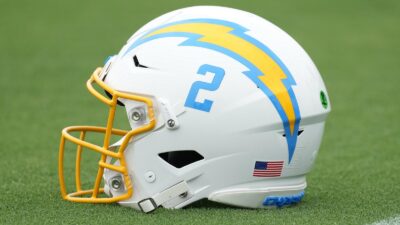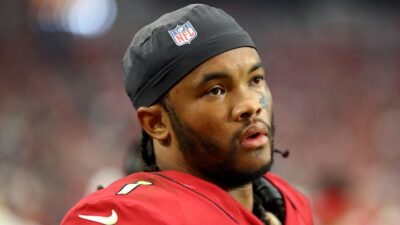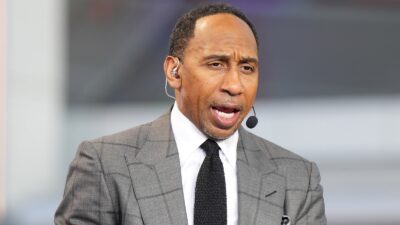 Perhaps you’ve been caught up in the playoffs extravaganza with the NBA and NHL. Maybe spring baseball is what captivates. After all, if the season ended today… you’d have a lot of confused people. (Why would the postseason start in May?) An even smaller segment of the population may have been enthralled by the sequins and color coordination that the World Figure Skating Championships affords. If you’re mesmerized by any of these or just simply don’t like to watch football televangelist Mel Kiper, Jr. (whose haircut was inspired by the movie Eraserhead), then, perhaps, the business-section allure that sports are currently providing is what entrances.
Perhaps you’ve been caught up in the playoffs extravaganza with the NBA and NHL. Maybe spring baseball is what captivates. After all, if the season ended today… you’d have a lot of confused people. (Why would the postseason start in May?) An even smaller segment of the population may have been enthralled by the sequins and color coordination that the World Figure Skating Championships affords. If you’re mesmerized by any of these or just simply don’t like to watch football televangelist Mel Kiper, Jr. (whose haircut was inspired by the movie Eraserhead), then, perhaps, the business-section allure that sports are currently providing is what entrances.
Courtroom drama, as well as business and corporate takeovers, are as much a part of Americana as crappy automobiles, point shaving, and Klondike bars. Unfortunately, we have seen what people would do for all three and it isn’t exactly pretty. Normally, at this time of year, football talk surrounds a lack of prudence, maybe not a pigskin but certainly a ball-and-chain. Now that conversation has turned to jurisprudence: the uniforms may not be as vibrant, but it gives players a chance to break out the Paisley without fear of being pasted. Should it surprise anyone that the Los Angeles Dodgers season has played like an episode of Law and Order? After all, the alleged owners do spell their name with “court.”
Who knew that sports fans would be trading in crossing patterns for cross-examination, running plays for running with the land, and touchdowns for torts? At this rate, impressionable youths will be trading in their Drew Brees jerseys for posters of Stephen Breyer (assuming such a thing exists). After a 36-hour end to the NFL lockout last week long enough for players to admire the new paint job at their training facilities, talk of post patterns returned to ex post facto. With the NFL successfully appealing to stop the passing for show and keep the impasse for dough, the only football in town for the time being is futból. With the NBA heading down the same road in a matter of months, how can sports let themselves be decided not in the court of public opinion but in the courts of Judge Judy, Ed Koch, Joe Wapner, and Judge Reinhold? (Wait, the last one is not a real judge.) Sports have truly become a story of nickels, dimes, and hundreds of millions of dollars. The kid kicking around a soccer ball on the field? Get his leg insured by Lloyd’s of London. The eight-year old who has a cannon for an arm? Better start the recruiting process. The toddler with an uncanny ability to master the knuckleball grip on baseball? Well, actually, I hear the Padres farm system is depleted, so…
It seems almost cliché to expect that many athletes these days are driven to play for the love of the game, the desire for competition, and the will to win. If that were truly the case, the best players would always play together regardless of the salary, something that past generations called sacrifice. Sure, you could point out how LeBron James, Dwyane Wade, and Chris Bosh all reportedly kibitzed during the 2006 World Basketball Championships when they were teammates for the US to determine that they would all play together when they became free agents in the summer of 2010 to collectively win a championship. But no one would confuse a $16-$17 million payday as some sort of self-sacrifice worthy of Buddha. Plus, that whole Samsāra concept would have precluded Udonis Haslem from being sidelined for injury for, oh, the last 75 games or so. With a few exceptions, most players in sport approach their craft like a business decision. The only difference between, say, Albert Pujols and this writer is the presence of decimal points on paychecks as opposed to commas (and of course the absence of any discernable athletic ability for the latter). Sure, average folks like athletes get paid to work overtime, but it is more likely they have to work more than 5 minutes to claim it and there is no sudden death, especially in the field of medicine, thank goodness.
Meanwhile, one of baseball prized franchises, the Los Angeles Dodgers, have turned into a circus: the ringmaster Frank McCourt, the juggler Don Mattingly using retread pitchers as props, and the human cannonball Jonathan Broxton (the fire breather Milton Bradley left town a while ago). With the team in danger of turning into a dog and pony show, master contortionist Bud Selig appointed Tom Schieffer to oversee the team’s operations, in a similar vein to what happened to the bankrupted Texas Rangers last season. One may wonder how long it will take for Schieffer, who worked for Senator Lloyd Bentsen, to tell McCourt, “You’re no Peter O’Malley.” Frank, who once successfully failed to buy the Boston Red Sox, Angels, and the Tampa Bay Buccaneers, will be drawing on the experience from frequent court visits (but has yet to purchase a luxury suite Downtown) to fight the move in- wait for it- the courts.
Well, it’s not all bad for American sports. After all, American ownership has even begun to claim ownership of soccer abroad with the Glazer family taking over reputable Manchester United in 2003 and Liverpool having John Henry, Tom Werner, and LeBron taking their ownership talents to northern England. Maybe this exchange is revenge for the Beatles taking over the U.S. at one point. Even in Italy, notable club AS Roma has been acquired by magnate Thomas DiBenedetto, for, as the saying goes, when in Rome, do as the Americans do.
The American sports system is represented by two separate yet equally important groups: the athletes who make the money and the people who pay them. These are their stories.













